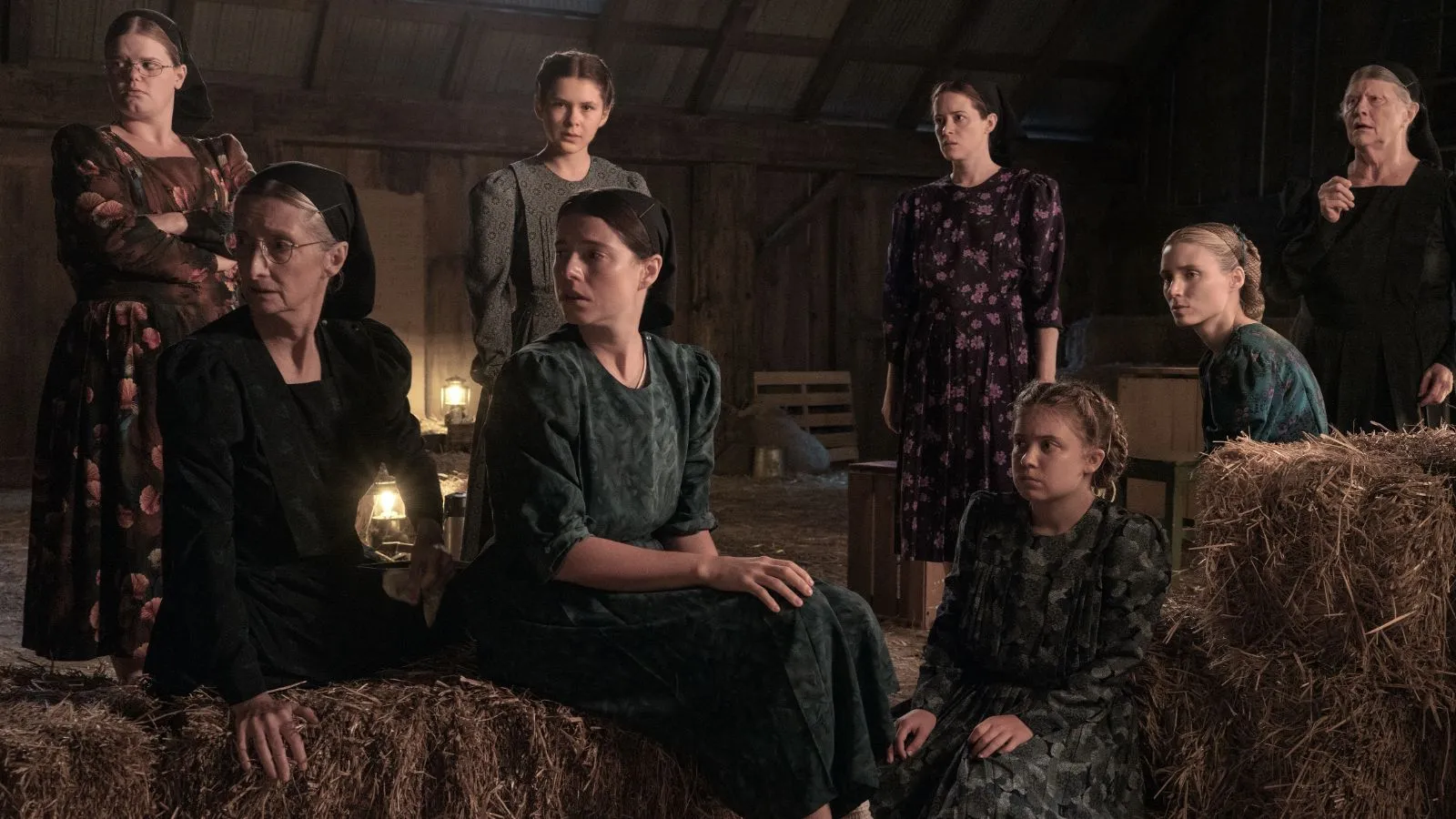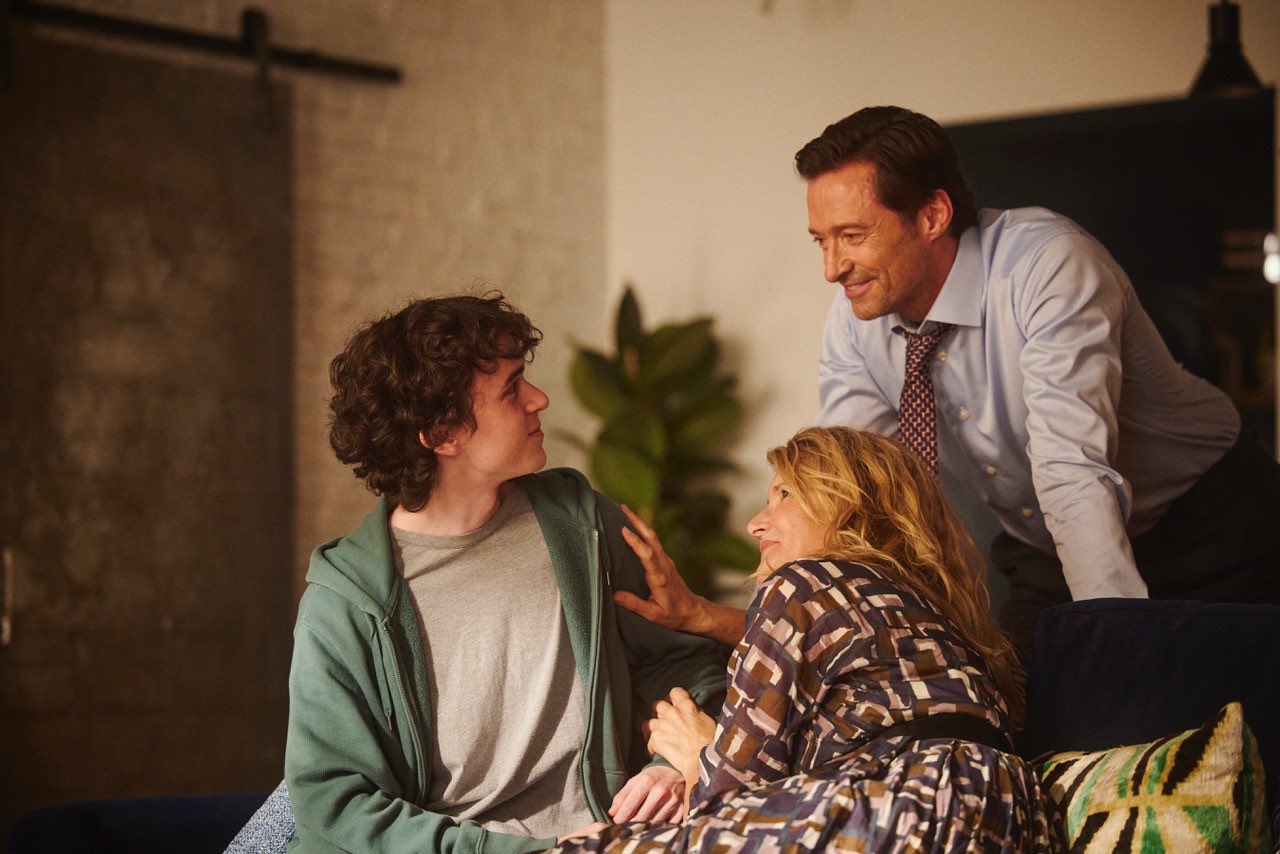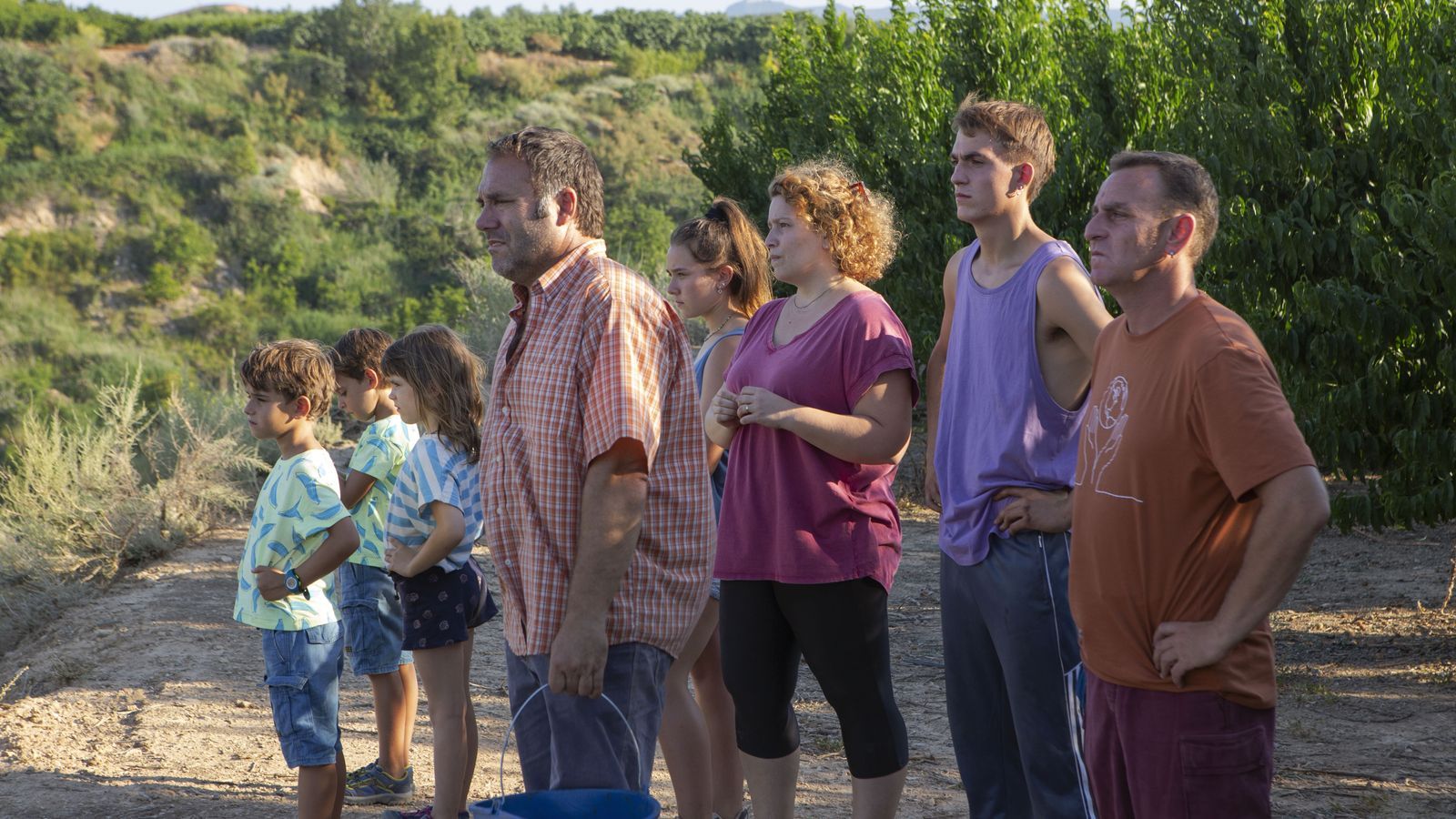AFI Fest: “The Son,” “Women Talking” and "Alcarràs"
 Sunday, November 6, 2022 at 6:00PM
Sunday, November 6, 2022 at 6:00PM by Christopher James
 Sarah Polley assembles a terrific ensemble for her fourth feature, "Women Talking."
Sarah Polley assembles a terrific ensemble for her fourth feature, "Women Talking."
Though Saturday was Day Four of the AFI festival, it was merely my second day spent wandering around the halls of the TCL Chinese Theater subsisting on popcorn and soda alone. What a doozy of a day it was. The films all spoke in different ways to parenthood, family, community, and gender dynamics. Between Sarah Polley's Women Talking, Florian Zeller's The Son and Carla Simón's Alcarràs which film soared to be the best of the bunch and which missed the mark entirely? My takes on all three are after the jump...
Women Talking (Dir: Sarah Polley)
Sarah Polley continues to improve as a filmmaker. The former actress burst onto the scene with the 2007 Oscar nominee Away from Her, following it up with the affecting Take This Waltz and the powerful and personal documentary Stories We Tell. Even with that strong resume, Women Talking feels like her magnum opus. Based on the novel by Miriam Toews, the film delivers on its promise and then some. Yes, it’s women talking to each other. However, it’s less of a dry retelling of an event and more of a fully alive conversation showing how solidarity, community, and debate can lead women out of violence and into a promised land of sorts.
The year is 2010 and a major shift has happened within a small, religious community. After a string of constant sexual assaults on the women of the community, elders have declared the assaults were all in the women’s imagination, acts of the devil rather than by one of their own. When two young women catch one of the men in the act, the consciousness of all the women of the town is awoken. The accused rapists, who we never actually see, are being held by the police in town. The men of the community have journeyed there to post bail and have demanded that the women forgive their rapists by the time they return in roughly two days. At the beginning of the movie the women (who are uniformly illiterate due to no schooling) vote on one of three options: stay and forgive, stay and fight, or leave. The result is a tie between staying to fight and leaving. Three families are elected to caucus and make a decision for the entire group. So begins a film that, while mostly hunkered away in a barn annex, still manages to feel epic and transformative.
Polley’s script does an incredible job giving each of the women their own perspective. The drama comes from the different ways they each process this shared experience. Age, motherhood, marital status and more all come into play to shape their differences. Ona (Rooney Mara), currently pregnant with her abuser’s child, harbors the most hope and hunger for leaving. She often provokes anger in the irascible Mariche (Jessie Buckley), who wishes to stay. Her barbed responses are nothing compared to the fiery rage of Salome (Claire Foy), who wants retribution for the acts done to the women in the community.
The entire ensemble is spectacular, with all women getting space to shine, tell their story, argue and even laugh. Buckley and Foy are currently winning the bulk of the Oscar talk, and for good reason. They have the most explosive monologues and Buckley, in particular, has an incredibly affecting arc. However, special attention should be paid to the matriarchs of the group, Greta (Sheila McCarthy) and Agata (Judith Ivey). They command the proceedings with grace and love, all while contending with their place in the structures that have led to these rapes. Were they wrong to teach their daughters forgiveness? The youngest members of the group, Autje (Kate Hallett) and Neitje (Liv McNeill), may often complain about being bored, but it’s not out of apathy. It’s black-and-white to them, as it is for the audience. They caught the men, the men should be punished. There’s also tension around how the women should bear the brunt of the abuse. In one of the more haunting arguments, Mejal (Michelle McLeod, a standout) suffers a panic attack through the conversation, only to be met with jeers by Mariche. Playing outside of the conversation is Melvin (August Winter), a trans man who only fully realized his identity after an incestual rape. Now, he’s taken a vow of silence to all except the children, the only people he feels can be changed.
An essential part of the narrative belongs to August (Ben Whishaw), the formerly excommunicated schoolteacher who has returned to the community. He takes the minutes for the meeting and harbors a crush on Ona. Whishaw provides a neat frame for the conversation, observing and chronicling what is said for posterity. What the women talk about is less about their own situation, but more the template for a new world where they can be safe. What does that look like and how can it be squared with their faith? Allies are needed in the fight for a just world, and August plays that part well, while also feeling crushed by the weight of changing the tide of the world of men.
There’s a lot to wrestle with in this, admittedly very talky film. However, under the helm of Sarah Polley, Women Talking is an engaging and important must-see of the year. Also, it’s incredibly funny. It’s not all gloom and doom. There’s joy, laughter and, much like in Barb & Star, a woman who just won’t shut up about horses. While the movie will make you think and contemplate your own role in upholding the patriarchy, it’s not here to lecture. After all, a lecture isn’t a conversation. A
Women Talking comes to movie theaters on 12/2 from United Artists Releasing.
 Hugh Jackman and Laura Dern star as divorced parents trying to break through to their struggling son in Florian Zeller's "The Son."
Hugh Jackman and Laura Dern star as divorced parents trying to break through to their struggling son in Florian Zeller's "The Son."The Son (Dir: Florian Zeller)
The “troubled son” sub genre is rife with This Had Oscar Buzz-esque duds. If there was anyone who could revitalize this Hallmark trope, one would think Oscar winner Florian Zeller (The Father) would be up to the task. Unfortunately, The Son is another maudlin entry in the Ben Is Back/Beautiful Boy vein, subbing in addiction for depression.
Peter (Hugh Jackman) seems to have the perfect second act. He and his beautiful new wife, Beth (Vanessa Kirby, underused), have welcomed a new baby into their home. This picturesque vision is interrupted when Peter’s ex-wife, Kate (Laura Dern, mining depth from her shallow characterization), knocks on his door asking him to take in their son, Nicholas (Zen McGrath, a poor man’s carbon copy of Timothee Chalamet). Peter thinks he’ll be able to break through to his teenage son, who has skipped months of school and has a habit of cutting himself. For as much as he tries, he finds himself unable to understand Nicholas’ pain or atone for the wounds left from him and Kate’s divorce.
Hugh Jackman enters each scene trying to out-emote the previous scene. The histrionics pile on one another like an exhausting jenga of acting. His most affecting and natural moments come when he sees glimmers of hope for Nicholas. When teaching his son to dance or watching tv with him, Jackman effectively sketches a fractured, yet real relationship between Peter and Nicholas. So many other moments feel forced or false. As talented as so many of the actors are, neither Dern nor Kirby are able to conjure up a believable relationship with Jackman. They’re strongest on their own, trying to swallow their fears about Nicholas and his mental state. Anthony Hopkins gives a jolt of energy to the film as Peter’s Father, but the movie seeks to so easily dismiss him as “another bad Father.”
Worse than anything, it’s hard to care for Nicholas as a character due to flat writing. The film is so much more interested in how his depression makes everyone else’s life worse rather than letting us into how it feels to be in his skin. His aversion to school is the main tip off that something is wrong. Yet, we never spend time seeing what he’s seeing or feeling what he’s feeling. McGrath also never convincingly makes Nicholas feel like a real person. He doesn’t seem to exist outside of the frame. Instead, the film just treats him as an obstacle that pushes our protagonist, Peter, to change. There are mentions to Nicholas being interested in writing, but nothing more is explored there. What is his character’s want?
It’s a shame that Florian Zeller’s second outing as writer and director feels so bald, calculated and one dimensional. His previous film, the Oscar winner The Father, was a bold and ambitious piece that presented dementia through a new perspective. Some of the elements that made The Father so fresh and innovative, such as tricky cuts and thoughtful, claustrophobic production design, are deployed again to much lesser results. The Son telegraphs every motif and flourish with the grace of a rampaging bull. What a disappointment.
Not to spoil too much of the film, but there’s a level of irresponsibility to the movie’s third act all in service of rug pulls and emotional twists. For the interminable 127 minutes of the film, it is clear that Nicholas has mental health issues that need treatment. However, the film wants to try and follow this “love conquers all” narrative, spitting in the face of actual medical science. The grimness that follows never feels earned. Rather than wringing tears, The Son provokes anger and frustration.D
The Son comes to movie theaters on 11/25 from Sony Pictures Classics.
 A family of peach farmers struggles to figure out what is next after losing their farm in Carla Simón's "Alcarrás."
A family of peach farmers struggles to figure out what is next after losing their farm in Carla Simón's "Alcarrás."Alcarràs (Dir: Carla Simón)
Writer/director Carla Simón has a curious ability to capture the experience of childhood. Her first feature, Summer 1993, was an effective mood piece from the point of view of a six year old. Her second film, Alcarràs, expands to cover roughly 12 characters, many of them children. While more ambitious, this film is even more successful at capturing the potency of emotions and the strange ways that love and stress get expressed in familial situations. Jason’s review of the film wonderfully captured what makes this film special. As a child of many generations of farmers myself, I too thought the film perfectly captured the love and precarity that comes with the profession. Alcarràs was wisely selected as Spain’s official submission for Best International Feature at the Oscars. It’s a quiet film, with not much of a narrative hook, which could hinder its Oscar chances. However, it would make a wonderful nominee thanks to its beautiful, melancholy honesty.
The film starts out on a painful revelation as summer starts. Our central family of peach farmers in Alcarràs, Spain will lose their farm after this year’s harvest. It’s the end of an era that all generations are dealing with in various ways. We spend the most time with Quimet (Jordi Pujol Dolcet), a hot tempered farmer who can’t fathom what his next move will be. He feuds with his two sisters, one of whom suggests working with solar energy providers to lease out the land. The sibling tension causes ripples down to the littlest kids, as Quimet’s youngest daughter Iris loses her favorite cousin playmates when they stop coming by the house. His eldest son, Roger (Albert Bosch), wants to take a more active role in farming, but feels stymied by his father. His middle daughter, Mariona (Xènia Roset) feels caught between childhood and adulthood and unsure of her place in the family. This causes some feuding with her mother specifically, the silent and weary Dolors (Anna Orin).
The use of non-actors in Alcarràs effectively creates a unique, believable family dynamic. All relationships in the family feel realistic. Alcarràs understands that familial fractures are less about big blowups and more about observed slights, decades long resentment and golden age thinking. In particular, we see the three adult siblings go from playing around the pool with their kids, to scuffling over solar panels.
As emotionally involving as the film was, it’s hard to spend two hours watching the summer go by. As Nathaniel pointed out, the pacing becomes a bit of a problem as the 2 hour run time goes on; a more economical cut would’ve done wonders. It’s commendable how Simón has constructed a rich dynamic with all these non-actors. Yet, having a more straightforward narrative with a little more focus could’ve turned this from very good to great. Still, Alcarràs is well worth not just a watch, but a nomination as well. B+
Alcarrás will be distributed by MUBI in the US. No release date has been announced.



Reader Comments (5)
I don't know if it was mentioned at TFE but the great Greek actress Irene Pappas died in September this year.
So happy that Sarah Polley is in conversation again. Away from her is an A++ movie still underrated IMHO
Ok, so Hopkins is going to campaign for The Son or Armageddon Time?
MUBI has Alcarràs! Wish they'd announce a release date
Sorry to be that person but it's AlcarrÀs not AlcarrÁs.